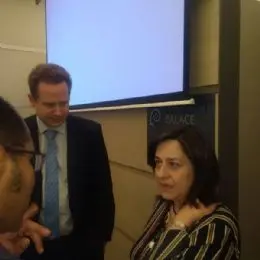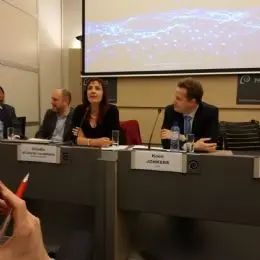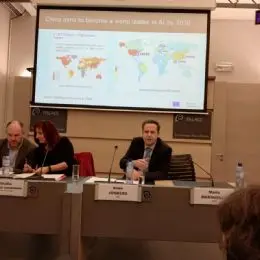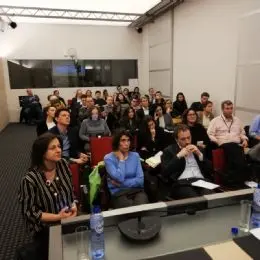What role can Europe play in the domain of Artificial Intelligence (AI)?
On 18 February 2019, the European University Institute Alumni Association (EUI AA) has held a Brussels-based event – organised by Alessandra Chirico, VP of the Association - on the challenges and opportunities currently faced by Europe in defining its role in the domain of Artificial Intelligence and Digital Transformation. Based on the discussions raised by the release of the Commission communication 'Artificial Intelligence for Europe' and its Coordinated Action Plan, the panel debate has given the chance to emphasise the value and expertise of the Alumni and of the general public attending the event, showing support and a sense of community around the EUI AA.
The panel – moderated by Tambiama Madiega - was composed of fellow Alumni (Mario Mariniello, Koen Jonkers, Claudia de Castro Calderinha and Alexandre de Streel) from different sectors: academia, consultancy, think tanks and European institutions. Such a high-level panel mirrored the synergies and intellectual and professional exchanges the EUI AA statutorily promotes in accordance with the core values of the EUI itself.
Here is a short outline of the topics debated:
- European decision-makers and regulators need to be ahead of the technological developments while encouraging uptake by both the public and private sectors while putting forward a human-centric AI strategy for the EU. They play a crucial role in monitoring, regulating, taming and foreseeing the scope, speed and direction of digital and societal transformation;
- AI has strategic geopolitical implications. It is crucial to understand where Europe stands in the global race to AI, also analysing the mobilisation of private and public resources in terms of investments and financing. The human-centric European strategy differentiates itself from the US strategy left mostly to private companies and self-regulation and from the Chinese government-led strategy;
- An appropriate legal, regulatory and ethical framework needs to be promoted and ensured, in an innovative and uncertain moving environment, where the concept of legal enforcement also needs to be revised;
- Europe needs to prepare itself for the socio-economic change, with the aim of filling in the gender gap affecting digital transformation in terms of competition policy, future employability, education, exclusion, democratic standards.
The panellists have emphasised the intrinsic multidisciplinarity and multisectoriality of AI.
The focus, however, has been on the political and regulatory approach Europe needs to take with respect to the digital and societal transformation brought about by AI.
AI is indeed about technology and how algorithms and machine learning systems work. Nonetheless, one needs to go further and examine how technology affects both society and human and social sciences, paying due attention to the issue of fundamental rights.
PROGRAMME
17:30-17:45 Arrival
17:45-18:00 Welcome from the EUI Alumni Association – Alessandra Chirico (AA Vice President)
18:00-19:00 Panel Discussion
Tambiama Madiega (EPRS) moderator
Mario Mariniello (EPSC) see presentation
Koen Jonkers (JRC)
Claudia de Castro Calderinha (Redscope Consulting) see presentation
Alexandre de Streel (CRIDS/Namur Digital Institute / University of Namur) see presentation
19:00-19:30 Q&A and common discussion
19:30-20:30 Networking reception




